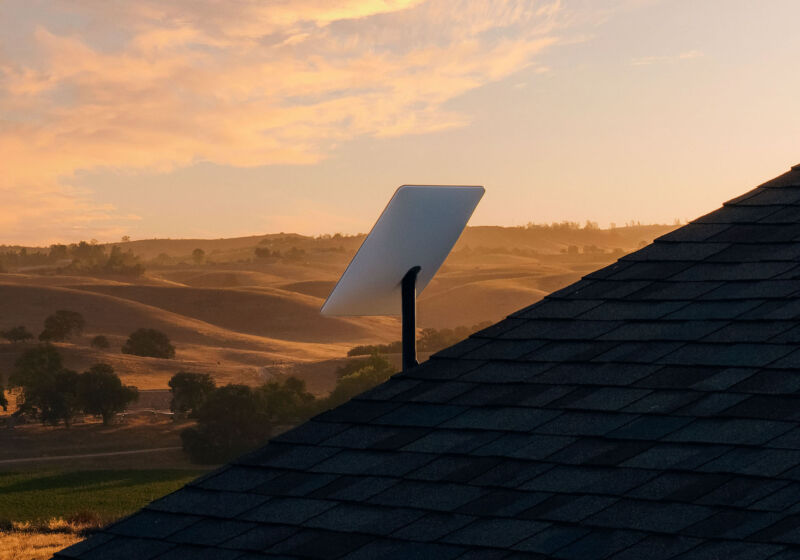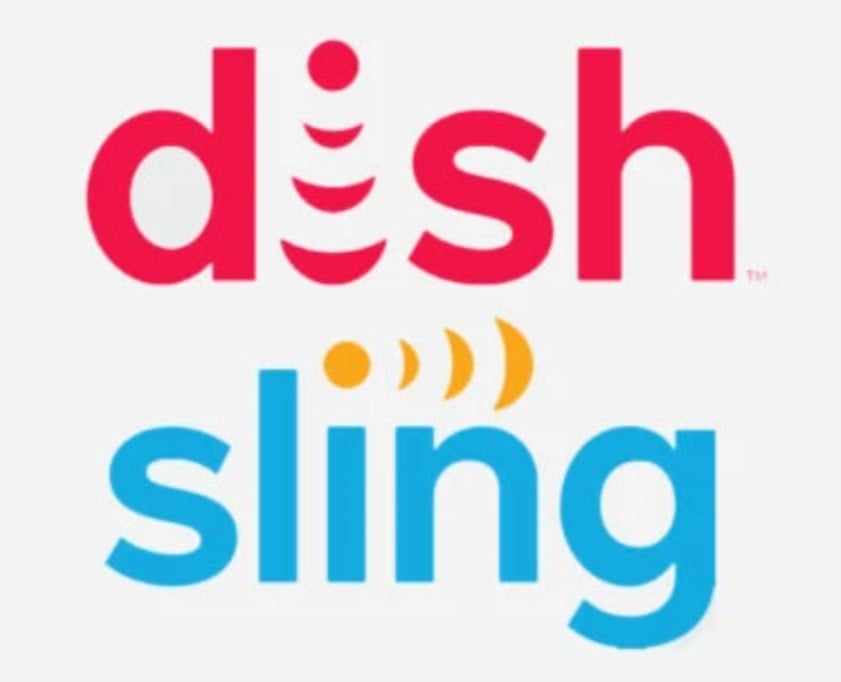
SpaceX is asking Starlink customers to help the company win a regulatory battle against Dish Network. In an email urging users to contact the Federal Communications Commission and members of Congress, SpaceX yesterday said a Dish plan to use the 12 GHz spectrum band for mobile service will cause "harmful interference [to Starlink users] more than 77 percent of the time and total outage of service 74 percent of the time, rendering Starlink unusable for most Americans."
Those percentages come from a study SpaceX submitted to the FCC last week, which claims mobile service in the 12 GHz band would interfere with Starlink user terminals that use the same spectrum for downloads. Tuesday's email from SpaceX was posted on the Starlink subreddit and covered by The Verge. It says:
Today we ask for your support in ending a lobbying campaign that threatens to make Starlink unusable for you and the vast majority of our American customers... Dish has been attempting to claim new rights to the 12 GHz band, which is the spectrum you currently use to download content with Starlink. Despite technical studies dating back as far as 2016 that refute the basis of their claims, Dish has employed paid lobbyists who are attempting to mislead the FCC with faulty analysis in hopes of obscuring the truth.
SpaceX: FCC and Congress "need to hear from you"
The email directs Starlink users to a webpage where they can submit a pre-written comment to the FCC and send a pre-written letter to US House and Senate members. The page is titled, "Don't let Dish disable your Internet."
"The FCC's proposed rule asks whether or not the 12 GHz band can be repurposed without causing interference with and disrupting services provided by satellites, like my Starlink Internet service. The answer to that question is clearly no," the pre-written comment to the FCC says. The pre-written letter to lawmakers asks elected officials to pressure the FCC to "refrain from repurposing this spectrum for new uses that will significantly interfere with my broadband service."
Starlink's email to users said the "FCC and your members of Congress have the power to stop this effort, but they need to hear from you."
We contacted Dish today and will update this article if we get a response. Dish is not alone in supporting mobile use of the 12 GHz band—a coalition created to lobby on the issue includes Dish along with a variety of telecoms, tech companies, industry lobby groups, and consumer advocacy groups.
SpaceX has separately been facing protests from Amazon over a plan to launch an additional 30,000 Starlink satellites. Amazon last week urged the FCC to approve only a small subset of those Starlink satellites to "offer SpaceX a path to begin deploying, while also providing the Commission time to carefully address the issues raised by its larger constellation."
FCC considers mobile service in 12 GHz
The SpaceX/Dish fight is taking place in an FCC proceeding that seeks public input on the "feasibility of allowing mobile services in the 12.2-12.7 GHz band while protecting incumbents from harmful interference."
SpaceX says Dish and a company called RS Access that is also seeking to use the 12 GHz band have failed to prove terrestrial mobile service in 12 GHz won't interfere with existing operators like Starlink. SpaceX urged the commission "to investigate whether Dish and RS Access filed intentionally misleading reports" on the potential for interference.
SpaceX said its own study found harmful interference to Starlink broadband terminals "even with very favorable assumptions that would reduce interference from mobile operations." SpaceX also said its study "shows the effect of this harmful interference will extend to a minimum of 21 km (more than 13 miles) from the macro base station" even in best-case scenarios with unobstructed conditions.
"This analysis verifies what should be intuitive—that a high-power terrestrial network would blow out anyone using the high-sensitivity equipment satellite consumers must use to receive signals that comply with Commission and international power restrictions on satellite downlink transmissions," SpaceX told the FCC.
Dish hasn't filed a response to SpaceX's new study yet but told CNBC that its "expert engineers are evaluating SpaceX's claims in the filing."
Dish previously told the FCC that the 2016 studies cited by SpaceX aren't relevant to the current debate because of technical advances in the years since. "Given that the enormous benefits of allowing 5G operations in the 12 GHz band can be realized without harmfully interfering with existing operations, the Commission should act expeditiously to unlock the power of 5G in this band," Dish told the FCC on June 6.
Dish already uses spectrum from the 12 GHz band for satellite TV, and has claimed that Starlink transmissions could interfere with the satellite service.
Dish: SpaceX broke US law
Separately, Dish accused SpaceX of violating US law by "encouraging Starlink users everywhere to operate their terminals when moving on planes, boats, and recreational vehicles," despite not having FCC approval for these earth station in motion (ESIM) operations. A Dish filing points to the new Starlink for RVs service and to SpaceX CEO Elon Musk's tweets about in-motion use of Starlink.
SpaceX wrote on June 8 that its RV service isn't designed to be used while the vehicles are moving. Dish says this is a "nominal prohibition" that SpaceX hasn't enforced.
Starlink accused of "abandoning rural America"
Regardless of whether Starlink customers are using the terminals on moving vehicles, consumer-advocacy group Public Knowledge says the RV service is troubling because SpaceX appears to be "abandoning rural America to chase the luxury vacation market." Public Knowledge told the FCC on Tuesday:
Starlink has repeatedly sold itself to the Commission and the public as the broadband solution for rural America. Indeed, Public Knowledge has repeatedly made clear that its support for coexistence in the [12 GHz] band is dependent on determining that any new authorized spectrum access will not cause harmful interference to Starlink precisely because its mission of providing broadband to rural America is critically important.
Over the last few months, however, Starlink has maintained that it cannot meet the demand for pre-ordered units in rural communities. Some rural customers who pre-ordered and as of April 2022 still had not received their satellite dishes have complained that Starlink has charged them price hikes for the equipment they have not received, with no promise of an actual delivery date.
Rural customers have faced "appalling" customer service when trying to get technical support or redress of billing or service issues. Apparently, SpaceX has decided to give customers in rural America a back seat to gamers on mountain tops and luxury RVs. Worse, while rural residents wait for their pre-ordered equipment—in some cases for over a year—Starlink for RVs is available "with no waitlist."
Public Knowledge took no position on whether Starlink's RV advertising violates FCC rules, but urged the FCC to reject an ESIM waiver requested by SpaceX. "Starlink's sole justification for requesting a waiver is its desire to offer a more lucrative luxury service in place of its commitment to serve rural Americans," Public Knowledge said. The ESIM waiver would let SpaceX "speed after the luxury vacation market populated by yachts and custom RVs," the group said.
Public Knowledge further said SpaceX's waiver request would let Starlink "create 'facts on the ground' to undermine the Commission's ongoing analysis to determine whether to open the 12 GHz band to sharing." Spectrum sharing in the 12 GHz band "is critical to the Commission's ongoing efforts to find spectrum for Wi-Fi 7" and could help Dish "become a viable 4th national mobile competitor, mitigating the harm done to competition by permitting T-Mobile to acquire Sprint," the advocacy group told the FCC.
"dish" - Google News
June 30, 2022 at 03:00AM
https://ift.tt/ARUxywr
Starlink tells customers that a Dish 5G plan would make Starlink “unusable” - Ars Technica
"dish" - Google News
https://ift.tt/WTmwGpc

No comments:
Post a Comment